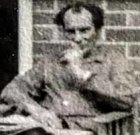
Murder Most Foul Page #3
- UNRATED
- Year:
- 1964
- 90 min
- 385 Views
Mrs McGinty
attended each performance.
- Why?
- It's an excellent play.
True, but her interest
was not primarily in the play,
former actress
though she may have been.
No, I am convinced
she was a blackmailer
and she was blackmailing
a member of this company.
- Her murderer, you suppose?
- I do.
- I think we deserve a small beer.
- Yes, please.
It's you, Inspector.
You gave me quite a turn.
You gave me
quite a turn, Miss Marple.
- May I come in?
- Well...
Yes.
It's Inspector Craddock, Mr Stringer.
Oh, how nice.
- Good evening, Inspector.
- Good evening.
Are you here socially
or officially, Inspector?
Well, a little bit of both
shall we say.
That poses an interesting problem.
Socially, I can
offer you a small beer.
Officially,
I cannot if you're on duty.
I...
All right,
Miss Marple, it's official.
Then perhaps some tea.
Won't you sit down?
Thank you, no. This won't take long.
We were playing anagrams, Inspector.
Miss Marple,
Police Constable Wells informs me
that he observed you this afternoon
at the late Mrs McGinty's cottage.
Oh?
You were impersonating
a rag-and-bone dealer.
I certainly was not.
- I was collecting for the church.
- Is that so?
If you don't believe me,
I suggest you ring the vicar...
..now!
Look, Miss Marple, in the past you've
been of some small help
to the police and we're grateful,
but at the trial you interfered
with the course of justice.
I'd feel a lot easier in my mind
and so would the Chief Constable,
if you would promise me here and now
not to continue to do so.
You can have that promise freely.
I have no intention of interfering
with the course of justice.
Yes.
Well, good.
- There's no more to be said then.
- No.
- I'll say good night.
- Good night.
Yes.
Perhaps we should have
confided our suspicions.
Certainly not.
That man has just
thrown down the gauntlet.
You know what the police are.
The month of September 1951...
This reference to a rose...
These things must have a great
significance for our man or woman.
I suppose so.
The difficulty is,
the Cosgood Players have moved on.
I read they were at
the Palace Theatre over at Halford.
There is no doubt in my mind
that one of these play actors
is a murderer.
If you're really convinced
of your theory,
I suppose we should
in some way, well, act.
Act!
Of course, why not?
That's what I must do.
After all, nothing ventured,
nothing gained.
Take our bags to the YMCA, Jim.
If I'm successful,
I'll collect mine from you later.
I think I ought to wait, Miss Marple.
No, this may take some time.
Au revoir.
All I know is that we had over 300
and now we've got nothing.
Where is it? It's a simple question.
Translation
Translate and read this script in other languages:
Select another language:
- - Select -
- 简体中文 (Chinese - Simplified)
- 繁體中文 (Chinese - Traditional)
- Español (Spanish)
- Esperanto (Esperanto)
- 日本語 (Japanese)
- Português (Portuguese)
- Deutsch (German)
- العربية (Arabic)
- Français (French)
- Русский (Russian)
- ಕನ್ನಡ (Kannada)
- 한국어 (Korean)
- עברית (Hebrew)
- Gaeilge (Irish)
- Українська (Ukrainian)
- اردو (Urdu)
- Magyar (Hungarian)
- मानक हिन्दी (Hindi)
- Indonesia (Indonesian)
- Italiano (Italian)
- தமிழ் (Tamil)
- Türkçe (Turkish)
- తెలుగు (Telugu)
- ภาษาไทย (Thai)
- Tiếng Việt (Vietnamese)
- Čeština (Czech)
- Polski (Polish)
- Bahasa Indonesia (Indonesian)
- Românește (Romanian)
- Nederlands (Dutch)
- Ελληνικά (Greek)
- Latinum (Latin)
- Svenska (Swedish)
- Dansk (Danish)
- Suomi (Finnish)
- فارسی (Persian)
- ייִדיש (Yiddish)
- հայերեն (Armenian)
- Norsk (Norwegian)
- English (English)
Citation
Use the citation below to add this screenplay to your bibliography:
Style:MLAChicagoAPA
"Murder Most Foul" Scripts.com. STANDS4 LLC, 2024. Web. 26 Apr. 2024. <https://www.scripts.com/script/murder_most_foul_14247>.



Discuss this script with the community:
Report Comment
We're doing our best to make sure our content is useful, accurate and safe.
If by any chance you spot an inappropriate comment while navigating through our website please use this form to let us know, and we'll take care of it shortly.
Attachment
You need to be logged in to favorite.
Log In